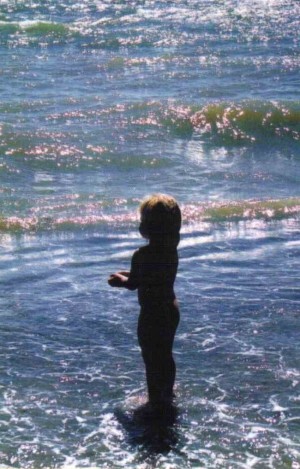
Chris as a child: cover photo for “Just a Face in a Crowd”
Having been asked to share the story of my writing life, I should start off by explaining (though I know this is not what she had in mind) how I got involved in one of Allyson’s memoir writing courses, for that’s where the inspiration — the confidence — came that was to result in my memoir, Just a Face in a Crowd.
Sorry to say, the only answer I have to the question of how I learned of her course is a brief three words long: I don’t remember. But I’m so glad I had that experience!
So too can the inspiration for a piece of writing often be forgotten. Do I remember that childhood journey to the zoo, or just the subsequent part of the visit when I was stung by a bee and rushed to hospital? Do I remember the joy at three years old of seeing my mother again after thinking I had lost her in the Christmas shopping crowds? Or the sight that followed of her terrified, tearful face as she smacked me for “running away’?
The snapshot in time that often constitutes a memory can be buried deep, or reappear so briefly that the writer wonders whether to broach the story at all. Then, on starting to write it down, the memory and imagination begin to blossom and bear fruit. Oh yes. That bee-sting. While writing about that, and about a resultant lifelong fear of flying insects, I may recall the smell of the doctor’s office, and how, afraid to ask for the bathroom, I wept with embarrassment on wetting my knickers.
And so it goes on. Suddenly I am writing a memoir.
I began writing years ago when the progression of my MS rendered me unable to continue to teach or pursue my favourite hobby, painting. My coordination deteriorated, and I became fatigued just getting my materials ready. I had to fill the time and exercise those creative brain cells, so, I wrote using an old electric typewriter. I’d tried writing memories down before, and kept an intermittent journal, but because of my inability to travel about to do research and check accuracy, I soon abandoned the idea in frustration.
 Then the computer entered my life along with its miraculously light keyboard, followed by the Internet. I was able to find out, or check up on, anything I wanted, without moving from my chair. I found that writing memoir woke my imagination — that it was possible to invent believable characters and plots. (While working on a story it’s sometimes hard to separate reality from the other thing!)
Then the computer entered my life along with its miraculously light keyboard, followed by the Internet. I was able to find out, or check up on, anything I wanted, without moving from my chair. I found that writing memoir woke my imagination — that it was possible to invent believable characters and plots. (While working on a story it’s sometimes hard to separate reality from the other thing!)
Most of my learning has come from online courses, workshops, and library books, and of course from writing every day. That daily discipline has been essential. (Long e-mails to good friends count towards this commitment.) Only when particularly unwell do I allow myself off that hook.
Allyson’s online course at the time was through Ryerson University in Canada. What a blessing the Internet is to those of us with health and mobility limitations! There were students from far-flung locations, and some of us quickly became good Internet buddies outside the writing process.
Was I the only student from the U.K.? Another three-word reply, I’m afraid. However I DO know I wasn’t the only one with shared memories from wartime, for some had immigrated to Canada carrying their memories with them. The crash and rumble of the blitz, as described by one student, sticks in my mind. As I remember, the piece she contributed began with a strong memory of a piece of knitting, unravelling as it dangled on its needle. It fluttered and swung from the second storey of a house that had the whole front wall missing, exposing what remained of a sitting room. The writer mused on the possible scenario played out over the previous and subsequent hours, the feelings, the sounds; she speculated on the effect of the trauma on the inhabitants. (If the writer is reading this, why not get in touch?)
What a pain in the neck I must have been to Allyson, insisting as I did, like an overearnest schoolgirl, that the work I sent up wasn’t critiqued sternly enough! She was being too kind in her comments, I said. Her patient reply took me many years to fully understand. It was the process of memorizing, of recall, that mattered at that early stage. Getting into the habit of writing regularly, getting the words down was important, the quality of the writing but a small part of that process as yet. Learning the “nuts and bolts” was to happen gradually or come later. She was so right.
It’s only now, with my own memoir in printed form and distributed to my family, for whom it was intended, that I comprehend her approach.
I’ve had years of experience in coordinating a few small, local writing groups since. I am, I must admit, a poor acolyte of my tutor, but retain very firm and warm memories of her place in my writing life, treating the members of “my” groups as she once treated me.
 I still write — does anyone ever stop completely? — but the depredations of illness and aging now limit my output. My first book, published privately, was intended for my three children and six grandchildren. They knew nothing of my past, my being sent to an institution (called an orphanage in those days) because my dad died when I was nine, and Mum lost his pension and fell ill, and couldn’t cope. I had always viewed this with inappropriate shame, but writing it all down laid that particular ghost. I have no other ambitions to be published, and I’m sure that’s just as well: I’m no star of the writing firmament! But perhaps I’ll assemble about twenty short stories into an anthology, so that my years of writing shorter pieces will not have been time wasted.
I still write — does anyone ever stop completely? — but the depredations of illness and aging now limit my output. My first book, published privately, was intended for my three children and six grandchildren. They knew nothing of my past, my being sent to an institution (called an orphanage in those days) because my dad died when I was nine, and Mum lost his pension and fell ill, and couldn’t cope. I had always viewed this with inappropriate shame, but writing it all down laid that particular ghost. I have no other ambitions to be published, and I’m sure that’s just as well: I’m no star of the writing firmament! But perhaps I’ll assemble about twenty short stories into an anthology, so that my years of writing shorter pieces will not have been time wasted.
I enter competitions and enjoy the occasion prize, but it is newsy e-mails to good friends, and short stories, and “homework” for workshops that keeps me happily occupied. Meanwhile, I attend local workshops, when health permits, and this keeps me in touch with what others are writing. Approaches have changed over the years, and it’s easy to become locked in what becomes a dated style.
I hope I’ll be able to write till I’ve only the energy left to breathe — and then I shall have to content myself with reading, or listening to, the works of others.
I never dreamed back when I sat down at that electric typewriter that someday I’d set myself the task of writing a 70,000-word memoir, and eventually complete it. Or that my granddaughter’s class, studying the Second World War, would read parts of my book as history brought alive, and that she’d be proud to loan her copy around. What a gift to last forever Allyson gave me in that course all those years ago.
♦ ♦ ♦
Excerpt from Just a Face in a Crowd: A patchwork of memories, Chapter 1:
“Sometimes a memory stutters, like a flick-book. It starts in excitement, accelerates, hesitates; it can chunter to a top before the episode is completely revisited. Or we remember being somewhere specific, perhaps, doing some particular thing. The details of preparing, arriving, completing the activity, are insubstantial or disjointed. Memories can slink, wraiths from a mist. Then we grasp them, struggle to hold onto images, sensations, significance. Try to pin down a particular sensation and, diaphanous and elusive, the memory drifts away, faces disembodied or forms without face. A sound or a scent, it may be, that brings a memory scuttling back; maybe the acrid tang of a smouldering cigarette end, the loathed flavour of sweetened milk, the sound of laughter an excluding room away. Even a word, pronounced in a certain way, will jolt a past image into focus.
My fourth memory is evoked by a place-name. The family — the lap-filling baby, my six siblings ranging from turbulent eight to eighteen and smoked-wreathed Dad — all vanish from mind on that precious day Mum buttons only my shoes and says, “We are going to Penge.” …
♦ ♦ ♦
CHRIS HAZELGROVE is the author of Just a Face in a Crowd: A patchwork of memories. She lives in the historic city of Winchester, U.K. She has three adult children and six grandchildren, and one husband, who knows how she likes her tea.
Hi Chris,
I well remember when you and I were students in Allyson’s early memoir writing course at Ryerson online. But most of all I remember your memories, and the reason for that is you wrote them so well. Yes, with the set up, we wanted more critique from those less eager to learn and share, but with Allyson’s guidance the course was a great launch pad for those of us who can’t quit the habit (of writing).
I’ve often told Allyson she was the catalyst for so many people I still share writing with, but she’s also the glue, because she keeps us updated on all that interests us for writing and specifically, memoir.
I read your first prize-winning piece, a well deserved award. It’s nice to know that we still keep our lights on and strive for better writing.
Thank you, Mary. How lovely to hear from you.
Sometimes both the course and my memories seem so long ago and far away. Now here you are, bringing them smack up to date with your response to my piece.
I loved your expression about Allyson being the ‘catalyst and the glue’ for her students. So apposite.
We are a privileged bunch, her alumni….
Merry Christmas!
Chris
From Pat Irwin Lycett:
“Thank you, Allyson. This is wonderful stuff!”
From Susan Siddeley:
“What a lovely post. So well written and evocative.”